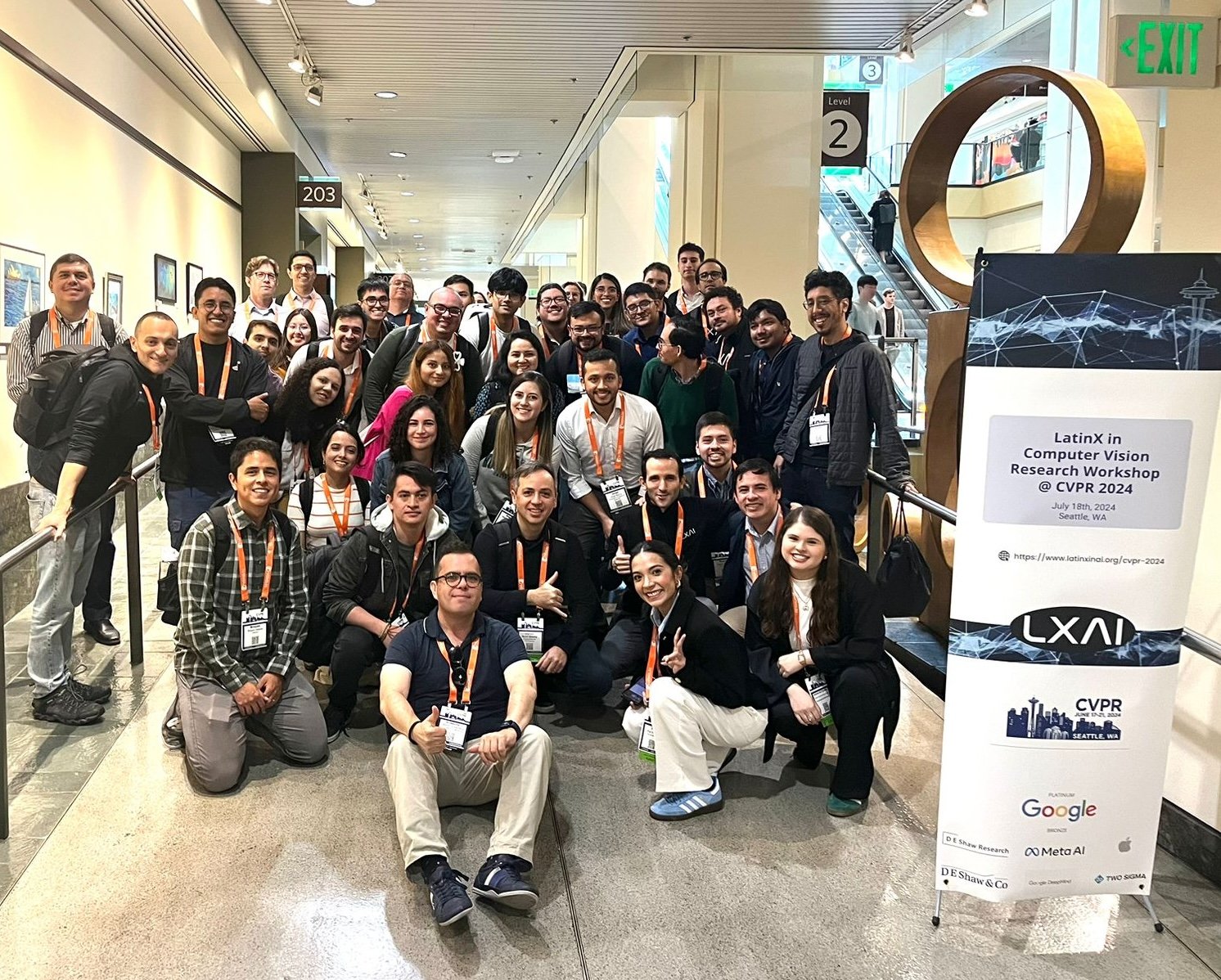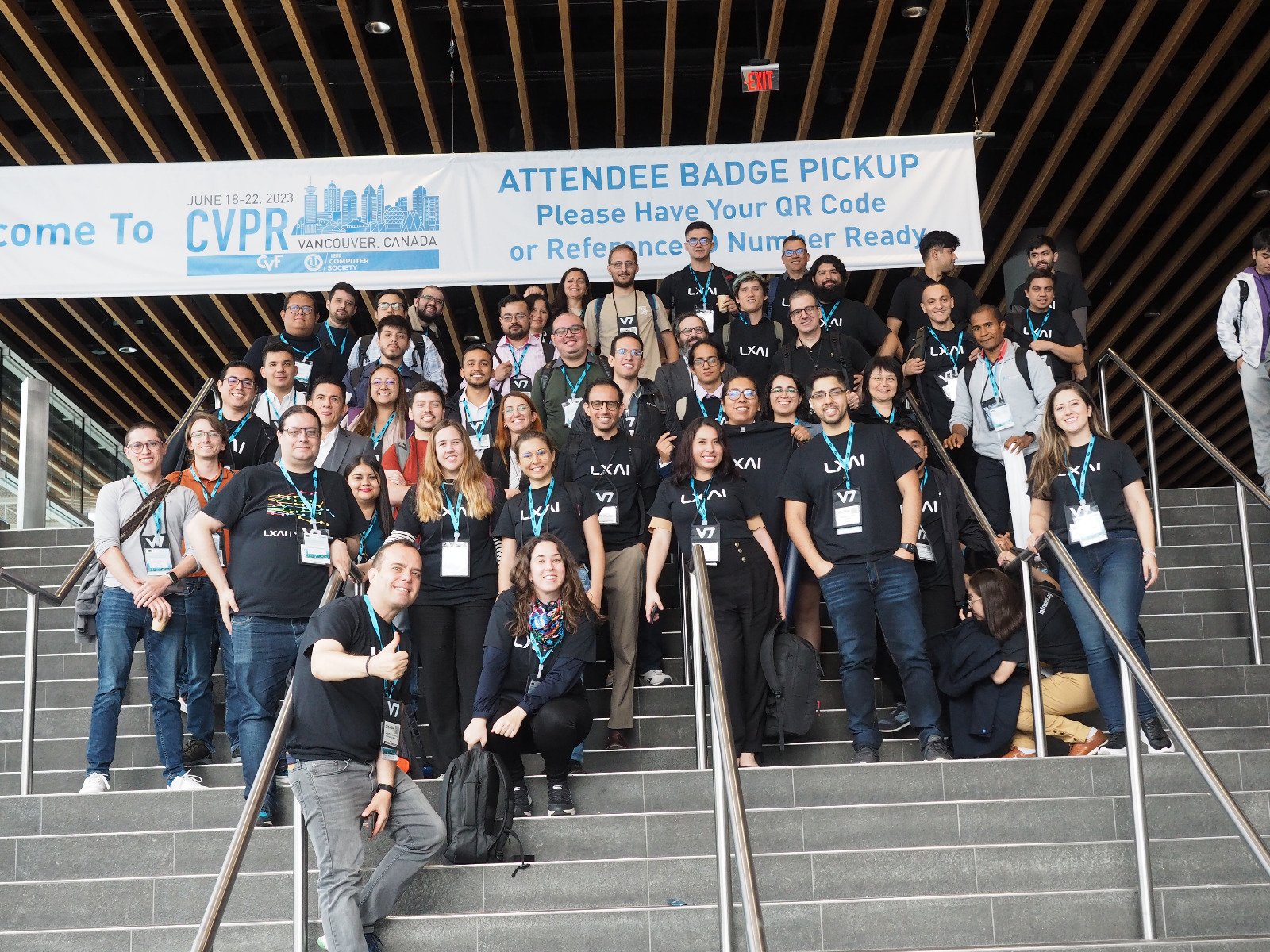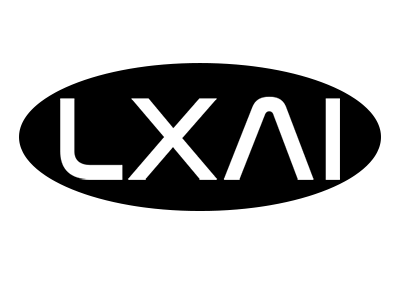LatinX in CV (LXCV) Workshop at CVPR 2025
This is an official workshop of the LatinX in AI (LXAI) organization, known as LatinX in Computer Vision (LXCV) at CVPR, which will be hosted at the Music City Center, Nashville TN, USA
We look forward to seeing you there!
PROGRAM SCHEDULE
ACCEPTED PAPERS
Full papers
Oral presentations
NExNet Seg: Neuron Expansion Network for Medical Image Segmentation. Abel Reyes-Angulo (Michigan Technological University)*; Sidike Paheding (Fairfield University)
Slot Attention-based Feature Filtering for Few-Shot Learning. Javier Ródenas Cumplido (Universitat de Barcelona)*; Petia Radeva (Universitat de Barcelona); Eduardo Aguilar (Universitat de Barcelona)
Scaling laws in zero-shot gender classification using CLIP. Lucas Ceschini (Federal University of Rio Grande do Sul)*; Gabriel Ramos (Universidade do Vale do Rio dos Sinos); Claudio Jung (Federal University of Rio Grande do Sul)
Posters
HeAL3D: Heuristical-enhanced Active Learning for 3D Object Detection. Esteban Rivera (TUMünchen)*; Surya Prabhakaran (TUMünchen); Markus Lienkamp (TUMünchen)
Emotions in LatAm: A new dataset and benchmark for emotion recognition in Latin America. Pooja Kishore Kumar (University of Twente); Willams Costa (Voxar Labs)*; Renato Nogueira Ferraz e Oliveira (Voxar Labs, Centro de Informática, Universidade Federal de Pernambuco); Veronica Teichrieb (Voxar Labs, Centro de Informática, Universidade Federal de Pernambuco); Estefania Talavera Martinez (University of Twente)
Towards Faster and More Compact Foundation Models for Molecular Property Prediction. Yasir Ghunaim (KAUST)*; Andrés Villa (KAUST); Gergo Ignacz (KAUST); Gyorgy Szekely (KAUST); Motasem Alfarra (KAUST); Bernard Ghanem (KAUST)
Enhancing Vision Transformer Explainability Using Artificial Astrocytes. Nicolas Echevarrieta-Catalan (University of Miami); Ana Ribas-Rodriguez (Universidade da Coruna); Francisco Cedron (Universidade da Coruna); Odelia Schwartz (University of Miami); Vanessa Aguiar-Pulido (University of Miami)*
PineSORT: A Simple Online Real-time Tracking Framework for Drone Videos in Agriculture. Danny Xie-Li (Instituto Tecnológico de Costa Rica); Fabian Fallas-Moya (Universidad de Costa Rica)*
Dream-box: Object-wise Outlier Generation for Out-of-Distribution Detection. Brian Isaac Medina (Durham University)*; Toby Breckon (Durham University)
Extended abstracts
Posters
GauCho: Gaussian Distributions with Cholesky Decomposition for Oriented Object Detection. José Henrique Marques (Federal University of Rio Grande do Sul)*; Jeffri Murrugarra Llerena (Stony Brook University); Cláudio Jung (Federal University of Rio Grande do Sul)
NamedCurves: Learned Image Enhancement via Color Naming. David Serrano-Lozano (Computer Vision Center)*; Luis Herranz (Universidad Autónoma de Madrid); Michael S. Brown (York University); Javier Vazquez-Corral (Computer Vision Center)
Generalized Recorrupted-to-Recorrupted: Self-Supervised Learning Beyond Gaussian Noise. Brayan Monroy (Universidad Industrial de Santander)*; Jorge Bacca (Universidad Industrial de Santander); Julián Tachella (CNRS, ENS de Lyon)
CAV-MAE Sync: Improving Contrastive Audio-Visual Mask Autoencoders via Fine-Grained Alignment. Edson Araujo (Goethe University Frankfurt)*; Andrew Rouditchenko (MIT); Yuan Gong (MIT); Saurabhchand Bhati (MIT); Samuel Thomas (IBM Research); Brian Kingsbury (IBM Research); Leonid Karlinsky (IBM Research); Rogerio Feris (IBM Research); James R. Glass (MIT); Hilde Kuehne (University of Tübingen)
NFL-BA: Improving Endoscopic SLAM with Near-Field Light Bundle Adjustment. Andrea Dunn Beltran (UNC)*; Roni Sengupta (UNC)
Prototype-Augmented Hypernetworks for Continual Learning. Neil De La Fuente (Computer Vision Center; Autonomous University of Barcelona); Maria Pilligua (Computer Vision Centre)*; Daniel Vidal Guerra (Computer Vision Center; Autonomous University of Barcelona); Albin Soutif (Computer Vision Center); Andrey Barsky (Computer Vision Center; Autonomous University of Barcelona)
DHiSS: A New OCR Dataset for Document Text Recognition in Historical Documents from the Chilean Dictatorship. Cristobal Vasquez Rosel (Pontificia Universidad Catolica de Chile)*; Luis Miranda (Pontificia Universidad Catolica de Chile); Darwin Sanhueza ( Pontificia Universidad Catolica de Chile); Jocelyn Dunstan (Pontificia Universidad Catolica de Chile); Domingo Mery ( Pontificia Universidad Catolica de Chile)
Interpretable CNN-Based Classification of Tauopathies from NFTs in Immunofluorescence Microscopy. Jesus Dassaef López-Barrios (Tecnologico de Monterrey)*; Miguel Angel Ontiveros-Torres (Tecnologico de Monterrey); Jose Antonio Cantoral-Ceballos (Tecnologico de Monterrey); José Luna-Muñoz (Universidad Politécnica de Pachuca)
HyperNVD: Accelerating Neural Video Decomposition via Hypernetworks. Maria Pilligua (Computer Vision Centre)*; Danna Xue (Autonomous University of Barcelona;Computer Vision Center); Javier Vazquez-Corral (Autonomous University of Barcelona;Computer Vision Center)
Beyond Blanket Masking: Examining Granularity for Privacy Protection in Images Captured by Blind and Low Vision Users. Jeffri Murrugarra Llerena (Stony Brook University)*; Haoran Niu (University of Texas at Austin); Suzanne Barber (University of Texas at Austin); Hal Daumé III (University of Maryland, College Park); Yang Trista Cao (University of Texas at Austin); Paola Cascante-Bonilla (State University of New York at Stony Brook)
Leveraging Visual Embeddings from Instagram for Credit Scoring of Informal Microbusinesses in Latin America. Omar Gonzales (Quipu)*; Viviana Siless (Quipu, Universidad Torcuato Di Tella); Michael Moreno (Quipu)
eBIRD: Event-Based Image Reconstruction by a Denoising Diffusion Probabilistic Model Control. Fabian Valderrama (University of O'Higgins); Ignacio Bugueno-Cordova (University of Chile; University of O'Higgins)*; Rodrigo Verschae (University of O'Higgins)
SignAttention: On the Explainability of Transformer Models for Sign Language Translation. Oscar Stanchi (CONICET)*; Pedro Dal Bianco (III-LIDI); Facundo Quiroga (III-LIDI); Franco Ronchetti (III-LIDI); Enzo Ferrante (LIAA-ICC)
Privacy-preserving Optics for Enhancing Protection in Face De-identification. Jhon Lopez (Universidad Industrial de Santander)*; Carlos Hinojosa (King Abdullah University of Science and Technology)
RAPTOR: Automatic Recognition of Trajectory Patterns from Radar Observation for Maritime Surveillance. Joao Dantas (Institute for Advanced Studies)*; Douglas Honorio (Institute for Advanced Studies); Jelton Cunha (Institute for Advanced Studies); Gabriel Dietzsch (Institute for Advanced Studies)
SignERT: An Efficient Pose-Only Transformer for Sign Language Recognition. Cristian Lazo Quispe (Universidad Nacional de Ingenieria)*; Gissella Bejarano (Marist University)
Deep Learning for Emotion Prediction in Children with Down Syndrome: Integrating Facial and EEG Data in Therapeutic Settings. Jesús Jaime Moreno Escobar (Instituto Poliécnico Nacional (IPN))*; Mauro Daniel Castillo Pérez (Instituto Poliécnico Nacional (IPN)); Erika Yolanda Aguilar del Villar (Instituto Politecnico Nacional, Centro de Investigación en Computación, Laboratorio de Ciencias Cognitivas Computacionales (CsCog))
Structural Image-Based Classification of Loxosceles Phospholipases Using Computer Vision and Transfer Learning. Karla Aguilar (Universidad Técnica de Machala)*
ORGANIZERS
Workshop Chairs
Operation and Logistics Chairs
Lidia Talavera Universitat de les Illes Balears
Willams de Lima Voxar Labs
Program Committee Chairs
Juan Luis González Flawless
Cristina Bustos Universitat Oberta de Catalunya
Presentation Chair
André Luiz Vieira Voxar Labs/Caf (Combate à Fraude)
Mentorship Chair
Ivan Reyes Amezcua CINVESTAV
Publicity Chair
Karen Sanchez KAUST University
Sponsor & Finance Chairs
Maria Fernanda Cortes Amazon Web Services
Jose Sosa University of Luxembourg
CALL FOR PAPERS
We strongly encourage students, post-docs, and researchers who primarily identify as LatinX , working anywhere in the world in all areas of Computer Vision to submit work describing new ideas, work-in-progress as well as previously or concurrently published research.
We welcome submissions in theoretical and methodological contributions, but also applications. While the presenting author need not be the first author of the work, we encourage authors to highlight the contribution of Latinx individuals — particularly the presenting author — in the abstract. While the event focuses primarily on researchers who identify as Latinx, everyone is invited to attend.
Important Dates (all deadlines at 11:59 PM PST)
Full Papers
March 19th, 2025 - Sign up as Reviewer deadline
March 20th, 2025 - Full Paper Submission deadline
April 4th, 2025 - Notification of Submission Acceptance
April 7th, 2025 - Camera-ready Submissions
CLOSED
Extended Abstracts
April 11th, 2025 - Abstract Paper Submission deadline
April 30th, 2025 - Notification of Submission Acceptance
May 12th, 2025 - Camera-ready Submissions
CLOSED
Topics of interest include all aspects of computer vision and pattern recognition, for guidance, you can check the topics of interest of conferences such as ECCV, ICCV, and CVPR.
We accept the following kinds of submissions:
Full Paper: Up to 8 pages excluding references. We allow supplementary material in another file. Accepted papers of this kind will be part of the official CVPR workshop proceedings and presented in the workshop. Note that these papers are expected to present novel and complete research. Submission website here.
IMPORTANT: Accepted papers may be given registration to CVPR.
Extended abstracts: Up to four (4) pages excluding references. They can present work in progress, exploratory/preliminary research or already published work, or any relevant computer vision applications for Latin America. Accepted papers in this track will not be archived in the CVPR workshop proceedings and can be published in another venue in the future.
Submissions will be double-blind peer-reviewed and should be submitted as a single PDF file. The submissions should strictly follow the guidelines provided by the CVPR 2025 to avoid the risk of being rejected without consideration of their merits. Please download and use the CVPR 2025 Author Kit for your submission. Submissions must state the research problem, motivation, and technical contribution. All submissions must be self-contained and include all figures, tables, and references.
CALL FOR PARTICIPATION
The workshop is a half-day event with invited speakers, oral presentations, and posters. The event brings together faculty, graduate students, research scientists, and engineers for an opportunity to connect and exchange ideas.
While all presenters will identify primarily as LatinX, all are invited to attend. LatinX in AI encourage applications for financial support to attend. It must be noted that the Latinx in AI organization can provide financial support for attending the conference, either in the form of registration fees or other travel expenses, if you have any questions feel free to contact us at lxcv-2025@latinxinai.org
FINANCIAL ASSISTANCE
Travel grants have already closed. Submit your paper and apply for an LXCV travel grant here. Deadline to apply: April 19th, 2025
Additionally, we invite you to take advantage of the travel and registration support options available through the CVPR DEI grant 2025. April 19th, 2025
OUR SPONSORS
If you are interested in becoming a sponsor, please send us a message at sponsor@latinxinai.org and we will follow up with more information.
BRONZE





















